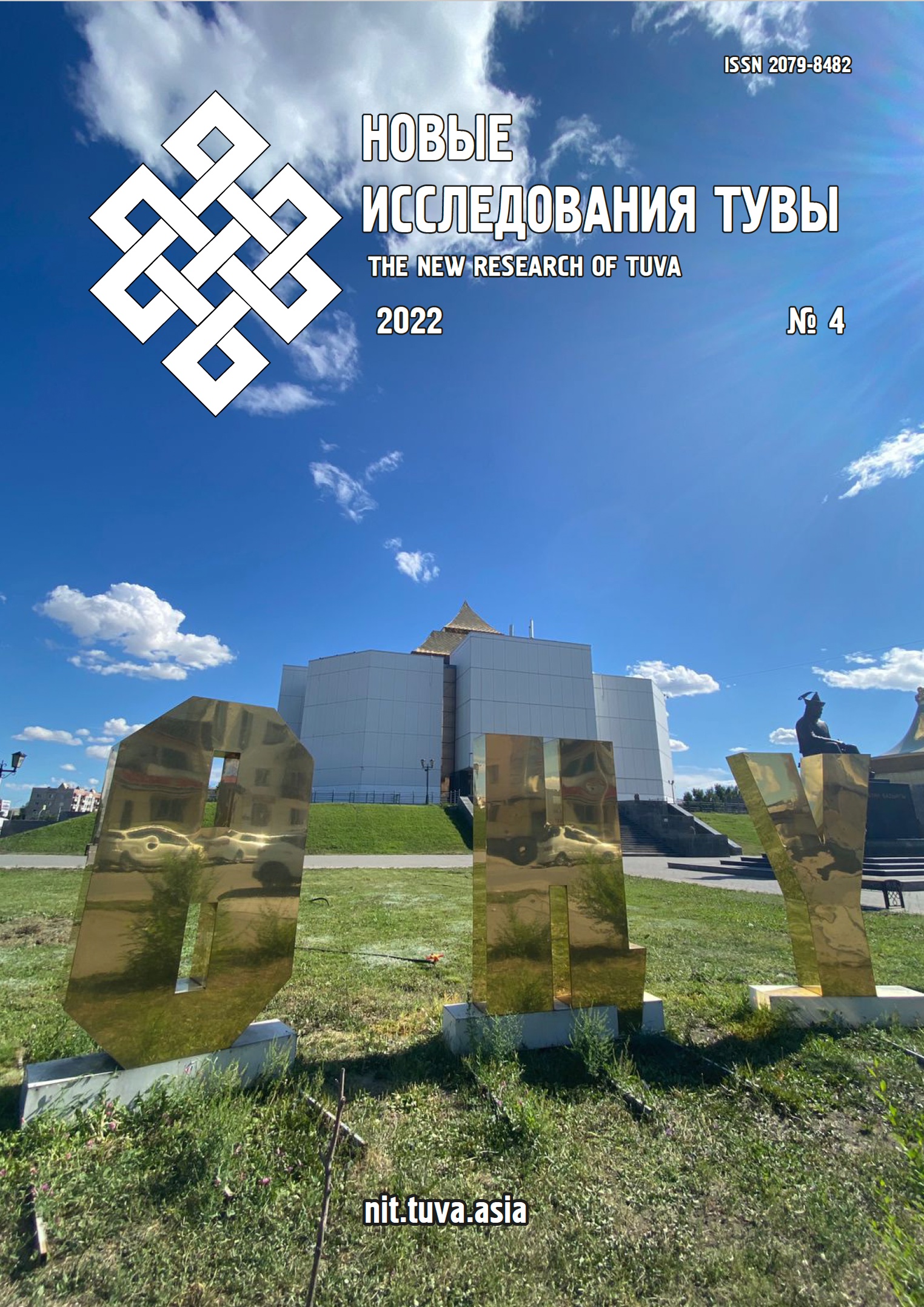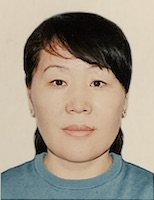Factors of vitality and sphere of functioning of the native language of the Tsengel Tuvans of Mongolia (according to the 2018 sociolinguistic study)
DOI:
https://doi.org/10.25178/nit.2022.4.6Keywords:
Tuvan language; foreign language environment; extralinguistic factor; self-identification; Tsengel Tuvans; Tuvans of Mongolia; language situationAbstract
The article deals with the linguistic situation among the Tsengel Tuvans who live in the sum of Tsengel in Bayan-Ölgii aimag, northwestern Mongolia. They speak the Tsengel subdialect of the Altai dialect of the Tuvan language. The analysis is based on the results of a sociolinguistic survey that covers 180 respondents who are residents of the sum of Tsengel. We characterize the status, spheres of functioning of the Tuvan language and determine the levels of language competence among the Tuvans of Tsengel as well as the impact of education on the level of proficiency in the native language.
The survey has shown that the majority of the respondents prefer to speak their mother tongue in everyday life. At the same time, they allow the use of borrowings from Mongolian in their speech and are fully aware of this. It has also revealed some extralinguistic phenomena that have influenced the features of the language situation: the impact of the political situation on anthroponymy; ancestral self-identification of the respondents; the level of their motivation to preserve and pass on their native language to the next generations, etc.
The Tsengel Tuvans of Mongolia are mostly multilingual, they speak not only their native language and Mongolian, but also Kazakh. There is an obvious strengthening of the role of Mongolian as a language of interethnic communication. The majority of the Tuvans in Tsengel have a motivation to preserve and transmit their native language as a factor of their self-identification. Along with the Mongolian Government’s state support of the language and culture of the Tuvans, this contributes to the development of the Tuvan language in the sum of Tsengel.
References
Aiyzhy, E. V. (2007) Tuvintsy Kobdoskogo aimaka Mongolii: etnichnost' i kul'tura [Tuvans of Kobdo aimag of Mongolia: Ethnicity and culture]. Kyzyl, Aniyak. 84 p. (In Russ.).
Aranchyn, Yu. L. (1975) Novye etnograficheskie i filologicheskie materialy iz Severo-Zapadnoi Mongolii [New ethnographic and philological materials from northwestern Mongolia]. In: Uchenye zapiski [Scientific notes] / Tuvan Research Institute of Language, Literature and History. Issue XVII. Kyzyl, Tuvan Book Publishing House. 280 p. Pp. 212–218. (In Russ.).
Bavuu-Surun, M. V. and Ondar L. M. (2012) Problema adaptatsii detei tuvinskikh skotovodov k shkol'nomu obucheniiu v usloviiakh sumona Tsengel Baian-Ulegeiskogo aimaka Mongolii [Issue of Tuvan cattle breeders’ children adaptation to school education in conditions of Tsengel sum of Bayan- Ölgii province of Mongolia]. Vestnik Tuvinskogo gosuniversiteta, no. 1 (12), pp. 62–64. (In Russ.).
Bayarsaykhan, B. (2020) Kratkie istoricheskie svedeniia o tsengel'skikh tuvintsakh [Brief historical information about the Tsengel Tuvans]. In: Tsengel'skie tuvintsy: fol'klor i literatura [Tsengel Tuvans: Folklore and literature] / comp. by U. A. Dongak. Novosibirsk, Nauka. 152 p. Pp. 12–23. (In Russ.).
Gansukh, Kh. and Tuiaa, U. (2016) Izuchenie tuvinskogo iazyka v Mongolii [Learning the Tuvan language in Mongolia]. Vestnik Tuvinskogo gosuniversiteta, Pedagogicheskie nauki, no. 4 (31), pp. 121–124. (In Russ.).
Graivoronskii, V. V. (1997) Sovremennoe aratstvo Mongolii. Sotsial'nye problemy perekhodnogo perioda 1980–1995 [Modern arats of Mongolia. Social problems in the transition period of 1980–1995]. Moscow, Vostochnaia literatura. 184 p. (In Russ.).
Dongak, A. S. (2011) Obraztsy i simvoly tengrianstva v obriadovoi poezii tsengel'skikh tuvintsev [Samples and symbols of Tengrianism in the ritual poetry of the Tsengel Tuvans]. In: Tengrianstvo i epicheskoe nasledie narodov Evrazii: istoki i sovremennost' [Tengrianism and the epic heritage of the peoples of Eurasia: Origins and modernity] : Proceedings of the 3rd International science-to-practice conference / ed. by K. A. Bicheldei. Abakan, Khakass Book Publishing House. 142 p. Pp. 63–67. (In Russ.).
Dongak, A. S. (2020) Osnovnye zhanry i osobennosti obriadovoi poezii tsengel'skikh tuvintsev [The main genres and features of the ritual poetry of the Tsengel Tuvans]. In: Tsengel'skie tuvintsy: fol'klor i literatura [Tsengel Tuvans: Folklore and literature] / comp. by U. A. Dongak. Novosibirsk, Nauka. 152 p. Pp. 42–60. (In Russ.).
Dongak, U. A. (2010) Zhanrovye raznovidnosti pesen tsengel'skikh tuvintsev (Severo-Zapadnaia Mongoliia) [Genre varieties of songs of the Tsengel Tuvans (northwestern Mongolia)]. In: Protiazhnye pesni mongol'skikh narodov [Drawling songs of the Mongolian peoples] : A collection of research articles / ed. by B. V. Bazarov. Ulan-Ude, Publishing House of the Buryat Scientific Center of the SB RAS. 158 p. Pp. 122–131. (In Russ.).
Dongak, U. A. (2020) Zhanrovye raznovidnosti pesen tsengel'skikh tuvintsev [Genre varieties of songs of the Tsengel Tuvans]. In: Tsengel'skie tuvintsy: fol'klor i literatura [Tsengel Tuvans: Folklore and literature] / comp. by U. A. Dongak. Novosibirsk, Nauka. 152 p. Pp. 61–69. (In Russ.).
Kara-ool, L. S. (2012) Nachal'naia tuvinskaia shkola Tsengelia [Tsengel Tuvan elementary school]. New Research of Tuva, no. 4, pp. 148–152. (In Russ.).
Mannai-ool, M. Kh. (1995) Tuvintsy Mongolii: traditsii i sovremennost' [Tuvans of Mongolia: Traditions and modernity]. In: Uchenye zapiski Tuvinskogo nauchno-issledovatel'skogo instituta iazyka, literatury i istorii [Scientific notes of the Tuvan Research Institute of Language, Literature and History]. Series: Historical. Vol. XVIII / ed. by Ch. M. Dorzhu. Kyzyl, Tuvan Book Publishing House. 200 p. Pp. 56–62. (In Russ.).
Mizhit, E. B. (2020) Drevniaia kosmologiia v mifakh tsengel'skikh tuvintsev [Ancient cosmology in the myths of the Tsengel Tuvans]. In: Tsengel'skie tuvintsy: fol'klor i literatura [Tsengel Tuvans: Folklore and literature] / comp. by U. A. Dongak. Novosibirsk, Nauka. 152 p. Pp. 83–94. (In Russ.).
Mongush, D. A. (1983) O iazyke tuvintsev Severo-Zapadnoi Mongolii [About the language of the Tuvans of northwestern Mongolia]. In: Voprosy tuvinskoi filologii [Issues of Tuvan philology] / ed. by D. A. Mongush. Kyzyl, Tuvan Book Publishing House. 160 p. Pp. 127–145. (In Russ.).
Mongush, M. V. (2002) Tuvintsy Mongolii i Kitaia. Etnodispersnye gruppy (Istoriia i sovremennost') [Tuvans of Mongolia and China. Ethnographic groups (History and modernity)]. Novosibirsk, Nauka. 128 p. (In Russ.).
Mongush, M. V., Bayarsaykhan, B. (2019) Kazakhi i tuvintsy Mongolii: etnograficheskii ocherk [Mongolia’s Kazakhs and Tuvans: Ethnographic sketch]. Asia and Africa Today, no. 3, pp. 59–64. DOI: https://doi.org/10.31857/S032150750004073-2
Ochir, A. (1993) Mongolyn oiraduudyn tüükhiin tovch [History of the Oirats of Mongolia] / ed. by Ch. Dalai. Ulan-Bator, Ulaanbaatar. 96 p. (In Mong.).
Samdan, Z. B. (2020) Transformatsiia skazochnykh zhanrov v fol'klore tsengel'skikh tuvintsev v usloviiakh sovremennogo bytovaniia [Transformation of fairy tale genres in the folklore of the Tsengel Tuvans in the conditions of modern existence]. In: Tsengel'skie tuvintsy: fol'klor i literatura [Tsengel Tuvans: Folklore and literature] / comp. by U. A. Dongak. Novosibirsk, Nauka. 152 p. Pp. 70–82. (In Russ.).
Salchak, V. S. (2020) Zagadki, poslovitsy i pogovorki tsengel'skikh tuvintsev [Riddles, proverbs and sayings of Tsengel Tuvans]. In: Tsengel'skie tuvintsy: fol'klor i literatura [Tsengel Tuvans: Folklore and literature] / comp. by U. A. Dongak. Novosibirsk, Nauka. 152 p. Pp. 95–120. (In Russ.).
Sat, Sh. Ch. (1987) Tyva dialektologiia [Tuvan dialectology] : A textbook. Kyzyl, Tuvan Book Publishing House. 99, [2] p. (In Tuv.).
Suvandii, N. D., Tsetsegdar', U. (2020) Sobstvennye imena u etnicheskikh tuvintsev Mongolii [Personal names of ethnic Tuvans in Mongolia]. New Research of Tuva, no. 4, pp. 156–168. (In Russ.). DOI: https://doi.org/10.25178/nit.2020.4.11
Taube, E. (1975) Izuchenie fol'klora tuvintsev Mongol'skoi Narodnoi Respubliki [Study of the folklore of the Tuvans of the Mongolian People's Republic]. Sovetskaia etnografiia, no. 5, pp. 67–70. (In Russ.).
Taube, E. (1994) Skazki i predaniia altaiskikh tuvintsev [Fairy tales and legends of the Altaian Tuvans]. Moscow, Vostochnaya literatura. 382 p. (In Russ.).
Tsengel'skie tuvintsy: fol'klor i literatura [Tsengel Tuvans: Folklore and literature] (2020) / comp. by U. A. Dongak. Novosibirsk, Nauka. 152 p. (In Russ.).
Tsetsegdar', U. (2003) Obraztsy fol'klora i rechi Kobdoskikh tuvintsev [Samples of folklore and speech of the Kobdo Tuvans]. Kyzyl, Tuvan Book Publishing House. 191 р. (In Russ.).
Published
How to Cite
For citation:
Bayarsaikhan B. and Saaya O. M. Faktory vital’nosti i sfery funktsionirovaniia rodnogo iazyka tsengel’skikh tuvintsev Mongolii (po dannym sotsiolingvisticheskogo issledovaniia 2018 g.) [Factors of vitality and sphere of functioning of the native language of the Tsengel Tuvans of Mongolia (according to the 2018 sociolinguistic study)]. New Research of Tuva, 2022, no. 4, pp. 78-88. (In Russ.). DOI: https://doi.org/10.25178/nit.2022.4.6
Issue
Section

This work is licensed under a Creative Commons Attribution-NonCommercial 4.0 International License.

Author(s) license holder(s) grant rights for their work to the journal (grantee of a license) under the simple non-exclusive open license in accordance with Art. 1286.1 «Open license for a research work, work of literature or fine arts», Civil Code of the Russian Federation.
New Research of Tuva publishes articles under the Creative Commons Attribution-NonCommercial license (CC BY-NC).
Since it is an open license, author(s) reserve the right to upload the article to their institutional repository, submit it to another journal (if it allows republications), or republish it on their own website (in full, or in part).
However, several conditions apply here:
a) The republished version must always contain the name(s) and affiliation(s) of the author(s), the original title and the hyperlink to the original version on the New Research of Tuva website;
b) It must be in open access, free of charge, and no category of readers must be in any way whatsoever advantaged over general readership.
c) should the contribution be submitted elsewhere by its author(s) without substantial modification (30% or more of original text unchanged), the body of the article should contain a disclaimer that the original version was published in New Research of Tuva (with a link to the respective page)
The CC-BY-NC is a non-revocable license which applies worldwide and lasts for the duration of the work’s copyright.










